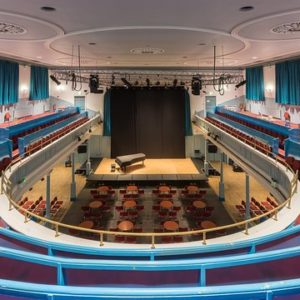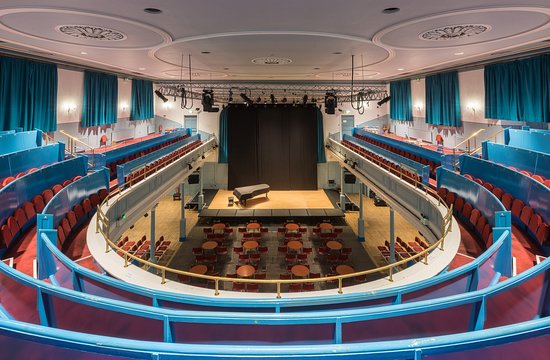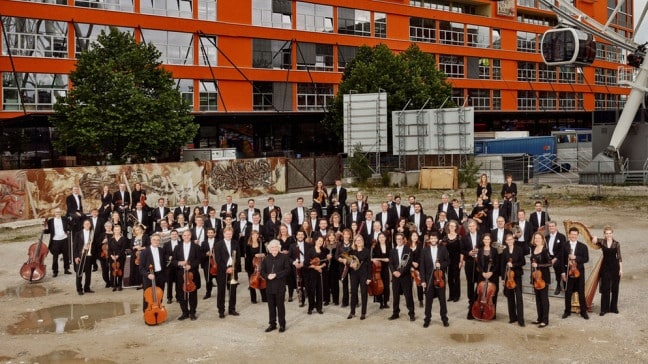Concerts without an interval? There are risks
NewsFrom Hugh Kerr, of Edinburgh Music Review:
Well there wasn’t an interval at the Queens Hall tonight but there was a mighty division between the opening Mozart Symphony and the very different Shostakovich which followed. Firstly I must report that this was my first orchestral concert of the autumn season and my first concert in the Queens Hall since before lockdown. My first impressions were that the Queens Hall has been busy since lockdown, opening up the ground floor cafe and the narrow hall way from the front door, and above all creating a suite of gender free toilets on the first floor (which are much better than the old toilets). In the concert hall they have taken away the stage and pushed the audience back to allow the orchestra a more socially distance layout. The audience was socially distanced and fully masked. It seemed a decent sized audience, although what social distancing does to the Queens Hall economics I’m not sure.
The first thing that struck me with the Mozart Symphony, known as the Posthorn Symphony, was how loud the opening movement was. …
Read on here.







Excuse me, but modern instruments can be SO LOUD, and I wonder whether they are good for the ears, which wasn’t the case in Mozart’s time. You certainly didn’t have, as was reported here, someone winning a court case for hearing damage having to sit in the pit of an orchestra accompanying a Wagner opera.
I actually for quite a few years only used an electronic keyboard, rather than an acoustic [grand] piano and you can turn it down; but then winning a competition to have my music performed in going back to having to play on one [grand] it actually could hurt my ears. ESPECIALLY in a little room. And I don’t think it’s a good idea to practice too long on such a thing, which makes me wonder what it’s doing to students for hours in practice rooms with a baby grand. With Mozart and Shostakovitch you have about the whole spectrum of volumes there, with Shostakovitch more insistent and louder than Rap music, and that’s WITHOUT electronic amplification, so take THAT Snoop Dog….
So what are the risks? The reviewer clearly stated that the 1.5 hour concert without interval flew by.
Context. Clearly stated.
I wasn’t sure either. The headline sounds like the lack of intermission introduces a risk of some kind, but I’m not sure what that would be. Extended time breathing the same air together? Audience members needing the toilet? The Posthorn Symphony is about 18′ and the Shostakovich is 48′ — so, longish but not Mahleresque.
Not sure how the economics work in the case of the SCO, but the writer mentioned economic risks due to social distancing, which limits audience size. Is the risk taken on by the Queens Hall (did I get that right? definite article, no apostrophe?) or the orchestra? Or maybe the orchestra owns the hall. In any case, paying the musicians on a small(er) number of ticket sales is risky.
And possibly the risks of the music being super loud? The reviewer doesn’t mention it except as something he noticed at the beginning of the Mozart.
And of course the risks that come with going to any kind of gathering of people nowadays, which hardly needs mentioning by this point. “Socially distanced and fully masked” seems to cover it.
Those are the risks I could gather from reading the review, at least…
I couldn’t find anything resembling a risk that had to do with the absence of an intermission.
Only the length of a Verdi Requiem, normally done without an interval when Ive sung it. But I would rather stay at home than mask up and sit there, no drink at the bar or any chit-chat about the concert to someone else.
Come to London. We have abolished social distancing, and face coverings are optional in the major concert halls (strictly speaking, face coverings are still mandatory on Transport for London public transport, but compliance is hearteningly low – I have sat in train carriages where less than 20% of people are masked – and enforcement is non-existent in my experience). Time to reclaim the old normal, and get on with life.
Front of House at Queens Hall is terribly restricted and the cafe is small so hopefully they had marks on the floor restricting peoples movement before going in to the hall.
“My first impressions were that the Queens Hall has been busy since lockdown, opening up the ground floor cafe and the narrow hall way from the front door…”
Maybe that situation is better now?
I like a little digestion time between pieces. It doesn’t have to be the full 20 mins, but just a little time to ponder the joys of the work just heard and to prepare for the upcoming piece.
I’ve felt this since my very earliest orchestral concerts. The standard format was Overture, Concerto (Interval) Symphony. I noticed that if it was a piano concerto, the time taken to get the instrument out on stage was most welcome. On the other hand, if the soloist walked out on stage, instrument in hand, the overture just vanished into the night.
‘Fine acoustic of the Queen’s Hall’?! It’s a dreadful hall which sums up the whole attitude to music in the United Kingdom of ‘make do and mend’. The seats are incredibly uncomfortable and the floor is stone, not the best acoustical material. The sight lines are terrible, even in the most expensive seats and the attitude of staff is that the audience is treated as a necessary evil.
Item. The 11 o’clock concerts during the Festival are a disgrace. Often, the audience, consisting predominantly of senior citizens, many of whom are frail and using walking aids, are subjected to a scrum since the ‘doors open’ policy of 10.30 is rarely adhered to. It’s not the first time the hall doors have not been opened until 10.45 which has led to waiting patrons spilling into Clerk Street causing a bottle neck. How no-one has been hurt is a mystery.
Often we’re told this is because the artists are ‘still rehearsing!’ I’m sorry, but the hall management should tell the artists that they have to be finished so the doors can be opened at 10.30. Either they should get out of bed earlier or they shouldn’t be playing at the EIF if their performance is dependent on an extra 15 minutes rehearsal time!
I remember one occasion where the piano technician threw a hissy fit because – my goodness! – the audience was being allowed in the hall!
The back stage facilities are embarrassing. The changing areas are little better than a glorified toilet. The hall itself is not immune to the noise of passing sirens from emergency vehicles.
I’ll be glad when this place is put in mothballs.
Might be pushing it to ask a violist to hold it for over 90 minutes. Just saying.
This seems long overdue.
There’s has been audience research going back two decades that shows people want shorter concerts so that they can either start later or end earlier. (And audiences want more weekend matinee concerts.)
And while I understand that musicians need a rest and the stagehands time to rearrange the seats, once intermissions go over 20 minutes, and certainly over 25 minutes, it feels like they’re just trying to make the concert seem longer than it really is (I doubt it helps them sell that much more food and drink).
Short concerts are well and good if you live near the concert hall (or work in a nearby office). For those of us coming from out of town, we want something a more substantial, to make the long journey worth the time (often longer than the concert itself) and expense (often greater than the concert ticket itself).
I agree that intervals that go over the advertised length are a nuisance, especially for those who might be in a hurry to catch the last train home after the concert. Then again, we need to spare a thought for the audience members who need to use the bathroom or who want to buy refreshments. In some venues, one can lose 10 minutes just waiting in a queue, even if all you want is a glass of tap water (to be fair, many venues have the good sense to set out some jugs of water with clean glasses to hand, which relieves congestion). And people need enough time to finish their snacks, ice-creams, or drinks before returning to their seats; there is nothing more irritating than someone slurping on a plastic cup (with all the associated crinkling every time the cup is handled) of wine during the 2nd half, a practice that all too many venues tolerate.
Mark Wrigglesworth? Made me griggle(sic) a bit this morning, surely it’s Mark Wigglesworth?
If the programming is well planned, a concert without intermission doesn’t feel “short”, “lesser than”, or “too long without a break”.